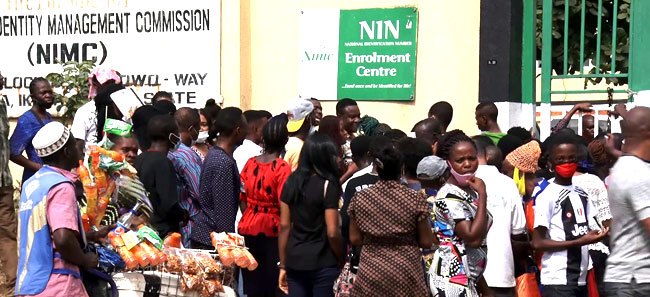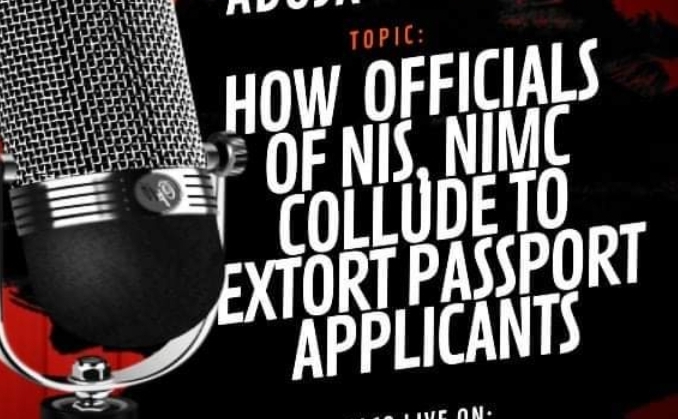In the fallout from an investigative report published by TheNewsGuru.com (TNG), Nigerians across the country have narrated the unabated extortion they are made to suffer in the hands of officials of the National Identity Management Commission (NIMC).
TNG had earlier published the first part of its investigative report on how NIMC officials collude with officials of the Nigeria Immigration Service (NIS) to extort innocent passport applicants in their offices.
In the report, TNG highlighted how officials of both agencies are taking advantage, and exploring the bottleneck and bureaucratic practices surrounding registration for National Identification Number (NIN), and updating of NIN data, to exploit Nigerians.
Following the publication of the report, the Progressive Impact Organization for Community Development (PRIMORG) invited the Deputy Editor of TNG, Mr Ediri Oyibo and Mr Lukman Adefolahan, a public affairs analyst to a radio programme on 99.9 Kiss FM, Abuja to discuss details and implications of the investigative piece.
The radio programme known as Public Conscience, supported by MacArthur Foundation, received live phone calls from Nigerians to share their experience in the process of registering for and updating their NIN data.
“When I went to my home town in Benue State to do my NIN, it was with money. We were asked to pay one thousand Naira to be registered. After we paid the one thousand Naira, officials started attending to some other persons who paid N2,000 and above. So, what they did is that they sidelined those of us who paid one thousand Naira.
“After paying the one thousand Naira, it will still take up to one week before you are registered. Every day you go to the centre, those who paid N2,000 and above are attended to before others. It is after they finish attending to the last person who paid N2,000 and above before they will start giving attention to those of us who paid one thousand Naira. The whole process is just so corrupt,” one caller said during the programme.
TNG reports testimonies of other callers from different States during the programme were not different from the narrative presented by this particular caller. The different testimonies during the radio programme corroborated the investigative report by TNG.
Meanwhile, Mr Adefolahan also narrated his own NIN experience, while calling on citizens to continue to resist any attempt by government officials to extort them.
He urged the Independent Corrupt Practices and Other Related Offences Commission (ICPC) to take up the report and conduct a corruption risk assessment to identify the vulnerabilities in these agencies and design a plan to mitigate such practices in other Ministries, Departments and Agencies (MDAs) of the government.
“With this report from NIMC, I expect the ICPC that has the mandate to conduct system review across over 900 MDAs, to pick this report and conduct a corruption risk assessment to identify the vulnerabilities in these agencies and design a plan to mitigate such in other MDAs.
“Myself, I went to the centre and say this is my NIN, but they told me I have to go to their headquarters, that I will need to go and update it. Why do I have to go and update a NIN my bank sent to me through my BVN.
“Many Nigerians have NIN without knowing. Assuming we have a centralised database, once you key that in, you should be able to get what you want. I have a NIMC centre very close to my office. They are collecting one thousand Naira from every Nigerian before they can register them for NIN.
“If we have a NIMC centre in the NIS headquarters in Abuja, the federal capital territory (FCT), and this kind of rot is going on where we have the Comptroller-General of Immigration, you can imagine what is going on across the country,” Adefolahan said.
TNG reports the public affairs analyst stressed that it was high time the government began to see media houses and civil societies as partners, and not foes. He stressed the need for NIMC to harmonize the data of Nigerians so that the loopholes created would not be there to exploit.
When asked what prompted the need to beam searchlight on the NIS and the NIMC, Mr Oyibo said it was out of the deluge of complaints received that undercover reporters were mobilized to ascertain the true position of things at the NIS headquarters.
Read an extract of PRIMORG interview with TNG’s Deputy Editor at 99.9 Kiss FM, Abuja below:
Give us an overview of the investigation your media house carried out
Thank you very much for another opportunity to further expose ongoing rot and corruption taking place in the Nigeria Immigration Service (NIS) and the National Identity Management Commission (NIMC).
In summary, we investigated how NIS and NIMC officials collude to extort innocent persons who apply to get the Nigerian international passport; how the bottlenecks and bureaucratic practices in both agencies encourage corruption in the system.
The investigation, published on TheNewsGuru.com (TNG), principally reveals the rot and corruption ongoing in both agencies – the NIS and the NIMC.
The Service at the time our investigation was published was under the purview of Mohammad Babandede, whose tenure expired this September following his retirement after 36 years of service. The NIS is now being led by Idris Jere as Comptroller-General in an acting capacity.
While the NIMC, previously under the purview of the Presidency, is now under the purview of Nigeria’s Minister of Communications and Digital Economy, Isa Pantami.
Why did you decide to beam your searchlight on NIS and NIMC
The need to beam searchlight on the NIS and the NIMC came up as a result of so many complaints and reports of corruption in the Commission that we received.
The complaints came from so many people who are having challenges in securing the Nigerian international passport as a result of issues with data mismatch between their BVN and NIN.
Following the complaints we received, we carried out desk research and found out that the Facebook page of the NIMC is filled with similar complaints, all of them unattended to.
So, we mobilized an undercover reporter to have a first-hand experience, and to report on the experience.
Away from the complaints we received, on Friday, 1st of October 2021, that is next week Friday, Nigeria will mark independence. From 1960 till date, 61 years, Nigeria doesn’t have the means to legally identify her citizens and a unified database of her citizens.
You see politicians go on national TV to say, people wreaking havoc in the country are not Nigerians, but aliens. Security in Nigeria is at ground zero. How do we identify Nigerians from non-Nigerians?
In September 2015, the United Nations (UN) General Assembly adopted the 2030 Agenda for Sustainable Development that includes 17 Sustainable Development Goals (SDGs).
The United Nations under the SDGs set certain targets for countries of the world to achieve, with the mantra: “leaving no one behind”. But it seems Nigeria is being left behind.
One of the target areas where Nigeria is being left behind is the area of identity for every Nigerian, which falls under Goal 16 of the Sustainable Development Goals.
The target of the SDG states that: “By 2030, Nigeria should have provided legal identity for every Nigerian, including birth registration”.
However, 2030 is around the corner; that is, 9 years from now, Nigeria has only been able to achieve about 31 per cent of legal identity for every Nigerian.
This legal identity is what we have come to know as the National Identity Card, which National Identification Number or NIN represents.
To put it in perspective, 31 per cent means Nigeria has only been able to capture 62 million unique NIN on the National Identity Database.
The projection is that there are over 200 million people in Nigeria; meaning there is 69 per cent of people to cover before 2030. If you add new births, the number will be higher.
So, we needed to investigate why there are lapses; and the bottlenecks and bureaucratic practices that impede the government from achieving set agenda.
Let’s go deeper a bit; can you explain how these extortions take place at the headquarters of Nigeria Immigration Service?
The federal government in December 2020 licensed 173 centres and 30 State government institutions to conduct the enrollment of NIN across Nigeria.
These centres and institutions, when they capture NIN, the data sit idle on the local computer, when it is supposed to synchronise with the central database of NIMC.
When you need such NINs for verification purposes, that is where the trouble starts.
This is bearing in mind that the Federal Executive Council (FEC) approved N25 billion for NIMC to upgrade its database infrastructure.
Away from that, when the federal government introduced BVN in 2014 to curb or reduce illegal banking transactions in Nigeria, BVN generated NIN for people who partook in the exercise.
And according to data obtained from the Nigeria Inter-Bank Settlement System (NIBSS), there are 44 million records of BVNs in Nigeria.
However, according to the Director-General of the NIMC, Aliyu Aziz, only 15 million people with BVN have been linked with NIN.
This means 29 million people with BVN are yet to be linked with NIN. Of these 29 million people, a big chunk of them has incomplete data or wrong data captured for them so that when they want to use NIN for verification purposes, they have issues.
The language they use for the issue at both NIMC and NIS offices is “your NIN never drop”, meaning “your NIN is yet to drop”.
So, we have some set of people who have correct data on their NIN but the NIN is yet to synchronise with the central database of NIMC, and others whose NINs are in the database of the NIMC but their data do not match with their BVN.
What many don’t know is that BVN-generated NIN must be verified in order to access NIMC.
So, you go to Immigration to process your international passport, and you are faced with either of these two challenges.
For NIS to capture your biometrics, the biodata on your NIN must be verified against the data you filled while applying for the passport online. When there is a mismatch, the passport application returns NIN verification failed.
The Immigration officer capturing your biometric will then advise you to go to the nearest NIMC centre to get your data corrected.
In the case of NIS headquarters here in Abuja, there is a NIMC centre right on the premises.
Now, to modify the data on your NIN, there are mandatory requirements.
First, you have to present the original copy of the NIN slip issued at first registration.
You have to make payments through Remita and have the printout of the Remita Retrieval Reference (RRR) Number.
The mandatory requirements are listed on the website of the NIMC.
However, TNG findings reveal that NIMC officials do not comply with the mandatory requirements for modification of NIN data, as officials of the Commission cut corners and flagrantly flout the laid down procedures for the modification of NIN data.
Findings by this medium when its reporter visited the NIS headquarters revealed that NIMC officials coerce applicants who want to modify their NIN data.
They fraudulently collect money from them and jump the mandatory requirements to modify the NIN data for them.
People pay as high as N50,000 to N70,000 to get their data corrected.
On top of that, after making the correction, you will still have to wait for the updated NIN to drop on the central database of the NIMC.
They will now tell you that if you want the NIN to drop quicker, you will have to make further payments.
This is the agony some passport applicants are passing through across the country as a result of lapses in the NIMC under the Minister of Communications and Digital Economy.
Mind you the Federal Executive Council (FEC) recently approved N25 billion for NIMC to upgrade it’s database infrastructure.
Who and who is involved?
As said, the NIMC under the Minister of Communications and Digital Economy is the enabler of this brazen corruption taking place.
Passport Officers, Immigration Assistants and Biometric Capture Officers at NIMC centres are involved in this.
Does the extortion apply in State offices?
The answer is yes. We conducted desk research and parts of it involved scrutinizing the social media handles of the NIMC to aggregate complaints.
Our finding was shocking. All of the complaints on the Facebook page of NIMC were left unattended to. We took the pains to reach out to every person that left complaints about NIN dropping on the NIMC Facebook page.
Our interactions with them showed that the extortion is happening across the country.
Did you get any response from Immigration or NIMC authorities on the fraud taking place in their respective agencies?
No responses whatsoever. Even calls put through were not answered, and the calls were not returned.
Several efforts to reach NIS Public Relations Officer, Mr Amos Okpu, an Assistant Comptroller, and Director of Corporate Communications of NIMC, Kayode Adegoke to address the matter proved abortive.
If you go through the Facebook page of the NIMC, you will see that all complaints there concerning this matter are left unattended to, yet they make fresh posts almost on a daily basis.
Are you aware of any action taken against the officers involved in the scam?
None. No actions were taken.
What are the ranks of the Immigration officers involved in extortion of passport applicants?
In every organization, there are good, and as well bad elements. Officers involved in the brazen act of corruption, and are low ranking officers.
However, this does not absolve top-ranking officers of wrongdoing as the enabling environment for the corrupt act thrives because top-ranking officers allowed it.
However, Passport Officers, Immigration Assistants and Biometric Capture Officers at NIMC centres are involved in this.
Besides the extortion of passport applicants at Immigration office, did you come across any other corrupt act?
Extortion, cohesion for monetary gains, is the biggest setback we observed. If this is curbed, it will go a long way in repositioning the NIS for good. However, there is brazen disregard for due process, and disregard for the welfare of applicants.
What will be your next line of action now that the report is out and the concerned authorities are yet to act on it?
You know, there is this deep-rooted impunity prevailing with those in power in Nigeria. Those in power in Nigeria feel they are untouchable, and that they can do all what is not, and get away with it.
For a person of the Minister of Communications and Digital Economy whose character and integrity is badly dented already, he doesn’t need much prodding before he did the needful.
The NIMC under the purview of Pantami is the agency among the two actually culpable in aiding the ongoing corruption. The Minister has to sit up and close the loophole.
However, what we have out is the first instalment of the report. We have records of names of those involved in the extortion that we might be forced to release to the public if both the NIS and the NIMC should continue to maintain impunity.
Meanwhile, according to PRIMORG, an invitation was extended to the management of NIMC to send a representative of the Commission for the radio programme.
TNG reports, however, no representative of the NIMC was present all through the duration of the radio programme.




![[TNG Exclusive] NIN: How NIS, NIMC officials extort passport applicants [Part 1]](https://thenewsguru.ng/wp-content/uploads/2021/09/Screenshot_20210902-225705.png)